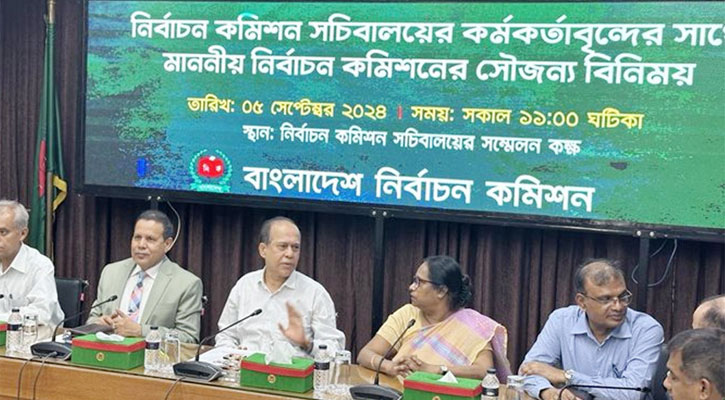Staff Correspondent
Published:2024-09-05 19:11:31 BdST
CEC, election commissioners resign
Chief Election Commissioner Kazi Habibul Awal and other election commissioners have resigned from their positions, recommending some reforms of the electoral system.
The announcement of their resignation came during a press conference on Thursday.
The CEC and the other commissioners – Brig Gen Md Ahsan Habib Khan (Retd), Rashida Sultana, Md Alamgir and Md Anisur Rahman – resigned exactly one month after the fall of Sheikh Hasina’s government on August 5.
Despite being appointed for a five-year term according to the constitution, the Kazi Habibul Awal-led commission stepped down after just two and a half years, after taking office on February 27, 2022.
They will meet with the president after the press conference, according to media reports.
During the briefing, Awal reflected on the commission’s tenure, marked by numerous electoral challenges, highlighting the complexities of managing elections in a politically volatile environment.
He said Bangladesh’s electoral history had consistently been contentious, noting that even the first constitutional general election in 1973 had been marred by disputes.
Awal said the 2008 election, conducted under a military-backed caretaker government, had also sparked controversy, with the BNP securing only 27 seats and the Awami League winning 230.
Negotiations between the BNP, Awami League and the caretaker government for a "safe exit" underscored the contentious nature of that period, he added.
More recent elections, including those in 2014, 2018 and 2024, had been held under party-based governments following the constitution, he said.
Awal said the 2024 election had been particularly notable for the boycott by major opposition parties, including the BNP.
He emphasized that constitutionally, the commission had no grounds to suspend or cancel the elections, which had led to accusations of bias.
Despite the controversy, the commission had implemented various measures to uphold electoral integrity, including the daytime distribution of ballots and video monitoring during by-elections, Awal added.
He acknowledged that ensuring free and fair elections in Bangladesh was a significant challenge, with electoral disputes often laid solely at the commission’s feet. However, he pointed out that past commissions had also been unfairly labelled as biased or dishonest.
Awal said fundamental reforms were necessary, including changes in the electoral process, political culture and candidate behaviour, recommending proportional representation-based elections, multi-phase voting, and elections conducted under non-partisan caretaker governments to ensure fairness and transparency.
Unauthorized use or reproduction of The Finance Today content for commercial purposes is strictly prohibited.


